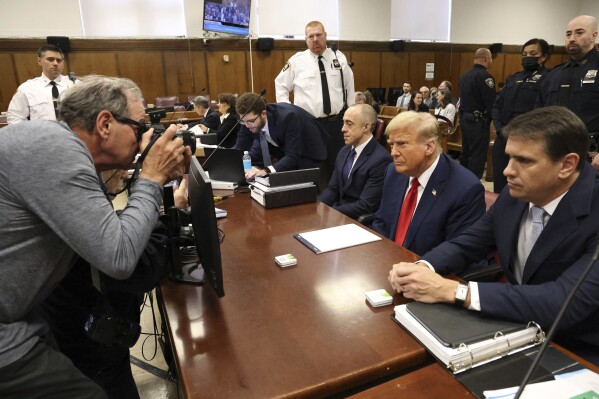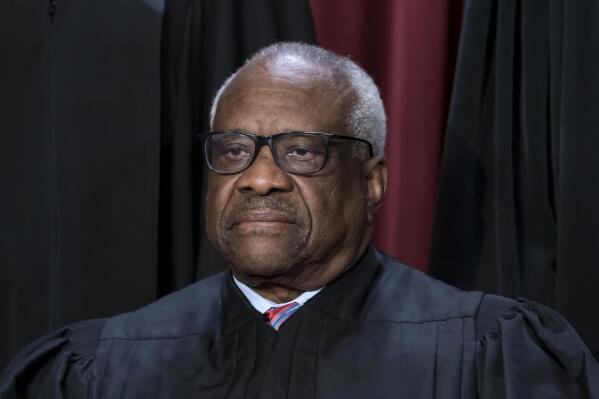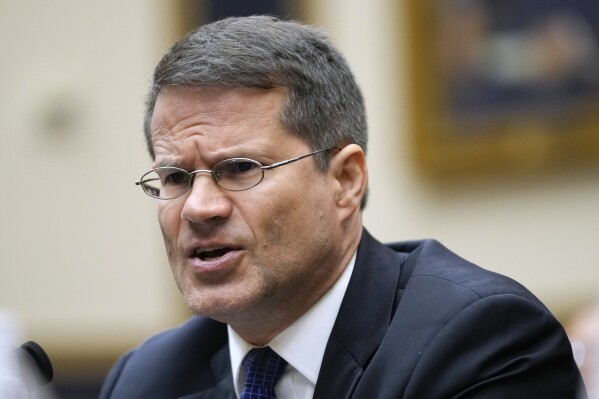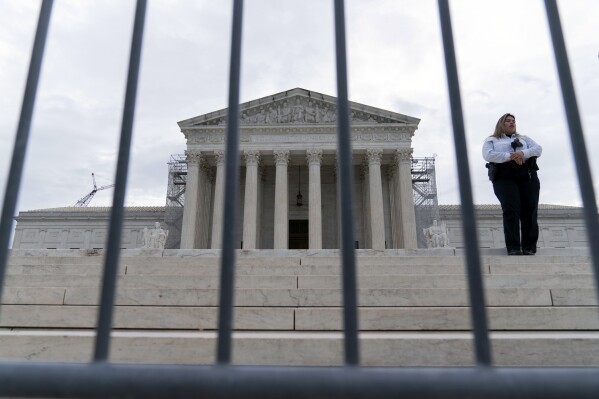Highlights from Supreme Court hearing on Trump immunity case
AP is live as the Supreme Court hears arguments Thursday over whether Donald Trump is immune from prosecution in a case charging him with plotting to overturn the results of the 2020 presidential election.
Today’s live coverage has ended but there’s still plenty to catch up on. Read what you missed below and follow the latest at apnews.com.
The Supreme Court has adjourned after hearing oral arguments over whether Donald Trump is immune from prosecution in a case charging him with plotting to overturn the results of the 2020 presidential election.
Here’s what to know:
- Who is D. John Sauer?: Trump’s lawyer arguing the immunity case was formerly a law clerk to Justice Atonin Scalia.
- When will the court rule?: That’s unclear. If the court hands down its decision in late June, which would be the typical timeframe, there might not be enough time to start Trump’s Jan. 6 trial before the election.
- Trump hush money trial: A ruling in Trump’s favor should have no bearing on his hush-money trial now underway, in part because that state-level case involves actions Trump took before he became president.
The court will next meet in public on May 9, the court’s marshal, Gail Curley, announced as arguments ended Thursday.
The justices typically announce their decisions at public sessions, though May 9 is almost certainly too early for a decision in this case.
Supreme Court arguments in the landmark U.S. v. Trump immunity case were scheduled to last for an hour, but ran more than double the allotted time.
The justices frequently go over the timelines set for arguments, but the immunity case stretched somewhat longer than the typical case, which usually ranges between 90 minutes and two hours.
In another case involving Trump, where a group of Colorado voters tried to have him removed from the ballot under the insurrection clause, arguments lasted about two hours.
In that case, both liberal and conservative justices agreed that Trump shouldn’t be kicked off and the court issued a relatively quick ruling.
The immunity case before the high court Thursday delved deep into the nuances of immunity, and key questions of when the high court might rule remain unclear.
Arguments have ended after more than two and a half hours.
Michael Dreeben, a lawyer for the Smith team, is working hard throughout the arguments to make clear that a prosecution in this case would not open the floodgates to other criminal charges against future ex-presidents.
In response to a question about drone strikes authorized by former President Barack Obama, Dreeben said the U.S. government already analyzed that fact pattern and concluded that there was “no risk of prosecution for that course of activity.”
The justices are keenly aware their decision on whether former commanders in chief have immunity will have huge implications not just for this case, but far beyond this prosecution.
Justice Gorsuch told Dreeben they are “writing a rule for the ages.” Justice Kavanaugh concurred, adding: “This case has huge implications for the presidency, for the future of the presidency, for the future of the country.”
Supreme Court justices seem highly skeptical of Trump’s claims of absolute immunity – but with arguments still underway, the essential question of when they might decide the case remains unclear.
The timing of their ruling could be as important as the outcome. At least five justices appeared likely to reject the claim of absolute immunity, but some also suggested that former presidents might have some immunity.
If their ruling reflects that and requires lower courts to then sort out whether immunity applies to Trump, it could push the trial past the November election.
The court usually releases its opinions by the end of June.
As the arguments stretched near the two-hour mark, Smith team attorney Michael Dreeben got to the heart of the government’s case, ticking through the acts Trump is charged with -- including a slate to elevate fake electors in battleground states -- that he said were undertaken in Trump’s status as a presidential candidate and not a president.
He did, however, note that Trump’s interactions with Justice Department officials in his administration were perhaps protected acts.
In oral arguments that have involved a lot of elevated legal jargon, the justices have also snuck in a few fun metaphors.
Striking a skeptical note while questioning Sauer, Chief Justice Roberts argued that expunging from the indictment acts that are official rather than personal would hobble the case, making it a “one-legged stool.”
Later, in conversation with Dreeben, Justice Alito brought up “the old saw about indicting a ham sandwich.” He was referring to the belief that indictments are easy to secure, and that they don’t necessarily indicate any likelihood of guilt.
Alito asked Dreeben if he had come across a lot of cases where a federal prosecutor wanted to indict a case and the grand jury refused. Dreeben said there are such cases, before Alito cut him off.
“Every once in a while there’s an eclipse, too,” Alito said, drawing some laughs in the courtroom.
Justice Alito pushed back on Dreeben’s argument that there are enough protections in the legal system to guard against prosecutors inappropriately bringing criminal cases against former presidents.
Smith’s team has noted that prosecutors must go to grand juries to get an indictment as one check against politically motivated prosecutions.
Alito responded with an old saying that prosecutors could convince a grand jury to “indict a ham sandwich.” Grand juries have long been criticized by some lawyers as little more than a rubber stamp for prosecutors.
Alito laid bare his concerns with Dreeben’s position, telling him that a prosecution of a former president by a bitter political rival could lead to a “destabilizing” effect on democracy.
It was one in a series of skeptical questions that showed his hand at resisting prosecutors’ arguments that no absolute immunity exists for a former president.
During the arguments, Justice Samuel Alito drilled down into the layers of protections that could shield a former president from an unethical prosecutor.
He says that regardless of the facts of this case, whatever the court decides will apply to all future presidents.
“This case will have effects that go far beyond this particular prosecution,” he said.
In keeping with the justices’ interest in hypotheticals, Alito asked about the internment of Japanese Americans during World War II and if that could have led to prosecution against then-President Franklin Roosevelt.
Some of the court’s conservative justices have been grilling Dreeben, much like how the liberal justices expressed heavy skepticism toward Sauer in the first hour of oral arguments.
The nation’s highest court. The doings inside a New York City courtroom. Former President Trump’s hush money trial in New York and his lawyers’ arguments about presidential immunity before the U.S. Supreme Court provided news outlets with an extraordinary split-screen moment on Thursday morning.
“To put it plainly, there is a lot going on,” said MSNBC’s Jose Diaz-Balart shortly before the Supreme Court arguments started.
MSNBC, Newsmax and NewsNation all chose to concentrate fully on the Supreme Court arguments as they were taking place. As they began, Fox News Channel covered them with a small box on its screen giving a live camera view outside the Manhattan courtroom where Trump was on trial, but it quickly dropped the box.
CNN was alone in trying to capture both, its audio carrying the Supreme Court arguments, while a live written blog with details of what was going on in the New York trial taking up about one-third of its screen.
“There’s this tawdry thing going on in the right side of your screen,” CNN’s Jake Tapper told viewers.
Justice Samuel Alito skeptically asked attorney Michael Dreeben if he was saying that if a president makes a mistake, he’s subject to criminal law just like anyone else.
But Dreeben replied that that was not his argument. He said when it comes to the president, making a mistake would not land you in criminal jeopardy.
The line of questioning underscored how the justices were wrestling with where to draw the line when it comes to immunity.
“He’s supposed to be faithful to the laws of the United States and the Constitution ... and making a mistake is not what lands you in a criminal prosecution,” Dreeben said.
Chief Justice Roberts raised questions about the lower court decision that found Trump did not have absolute immunity, saying part of that decision suggests that the simple fact charges were filed shows presidents can be prosecuted.
Roberts said that prosecutors aren’t always right, and that standard might not create enough protection for a criminal defendant.
“Why shouldn’t we either send it back to the court of appeals or issue an opinion making clear that that’s not the law?”
Justice Thomas said that other presidential acts in the past would have seemed ripe for prosecution and yet none occurred.
In response, Dreeben said the core distinction is that those other controversial acts were not crimes.
“The reason why there have not been prior criminal prosecutions is that there were not crimes,” Dreeben said.
Dreeben said the Smith team was not endorsing a system in which presidents would be exposed to prosecution for mistakes or bad judgments.
Michael Dreeben, a lawyer for the Smith team, said the court has never before recognized absolute immunity for a former president.
“Such presidential immunity,” he said, “has no foundation in the Constitution.”
Justice Clarence Thomas asked Dreeben if he was saying that there was no immunity even for official acts.
Dreeben said yes and also said impeachment and conviction before the Senate is not a prerequisite for a courtroom prosecution.
Dreeben says there are plenty of checks in the justice system to prevent against politically motivated prosecutions against former presidents.
“The existing is a carefully balanced framework. It protects the president and but not at the high constitutional cost of blanket criminal immunity,” he said.
Much of the hearing has centered around discussion over whether a wide array of hypothetical actions and actions Trump has been charged with would be classified as an official act.
For example, Justice Kagan brought up the hypothetical question, “How about if a president orders the military to stage a coup?”
Prosecutors have argued that the charges Trump faces, including participating in a scheme to enlist fake electors in battleground states won by President Joe Biden, are not part of the official duties of the president.
Sauer argued during the hearing that even participation in a fake elector scheme would be considered an official act.
He also argued that a former president “has to be impeached and convicted before he can be criminally prosecuted.”
Prosecutors have said conviction would not be a prerequisite for prosecution.
Jackson questions Sauer on why the president would not be required to follow the law when making official actions in office, noting that other people who have consequential jobs make decisions with the knowledge that if they break the law they will be held responsible for it.
“I don’t understand how the president stands in any different position with respect to the need to follow the law as he is doing his job than anyone else,” she said.
“If there’s no threat of criminal prosecution, what prevents the president from just doing whatever he wants?”
Justice Gorsuch poses a line of questions that appear friendly to the defense arguments, suggesting that if presidents fear they could be prosecuted after they leave office they could begin preemptively pardoning themselves.
“We’ve never answered whether a president can do that. And happily, it’s never been presented to us,” he said.
Justice Barrett took issue with a key argument of the Trump team -- that, under the Constitution, former presidents must be impeached and convicted before the Senate before they can be prosecuted in court.
Barrett says no one has ever suggested that the justices would need to be impeached and convicted before they could be prosecuted. Sauer responded that under the Constitution, the sequence is only mandatory as it relates to former presidents.
Trump attorney D. John Sauer advanced a position that even the creation of slates of fake electors in battleground states won by President Joe Biden is an official act.
That’s a notable position given that the fake elector scheme figures prominently not only in Jack Smith’s case but also multiple state-level prosecutions related to the 2020 election.
Justice Elena Kagan asked a Trump attorney: “Does it strike you as odd that your position on immunity goes far beyond” the standard created by the Justice Department’s Office of Legal Counsel, which has said sitting presidents cannot be prosecuted but has said nothing about former presidents.
Supreme Court Chief Justice John Roberts could be a key swing vote in the case and is a likely candidate to write the court’s opinion assuming he’s in the majority.
During arguments, he struck a skeptical note about the idea of expunging from the indictment acts that are official rather than personal, saying such a move would render the case a “one-legged stool.”
Justice Samuel Alito, a staunch conservative and appointee of former President George W. Bush, said he considered it “implausible” that a president could legally order Navy SEAL Team Six to order the assassination of a political rival.
That skepticism matters because that hypothetical is something that the Trump team has suggested could theoretically be protected from prosecution for such an act unless first impeached and convicted in Congress.
Justice Amy Coney Barrett asked Trump attorney D. John Sauer a question that cut to the heart of the case, reading aloud allegations from the indictment and asking him to respond whether Trump’s actions in each instance were private or official.
Trump’s attorneys concede that immunity does not extend to personal actions but instead protects official acts. Sauer said he believed most of the acts are unquestionably official.
Sauer, however, conceded that some of the allegations in the indictment are not official acts, including pressing private attorneys to willingly spread false claims of election fraud.
Justice Neil Gorsuch seemed to leave open the possibility of further proceedings before a lower court to determine whether the acts underpinning the indictment are official acts or not.
Both the trial judge and a federal appeals court have said that because absolute immunity for a former president does not exist, there’s no reason to determine whether the acts in question are official or not.
Justice Ketanji Brown Jackson, another liberal member of the bench, is also sharply grilling Sauer, saying he was asking for a “change” in the law related to immunity.
The skeptical line of questioning so far was no surprise given that the three liberal members of the bench were all expected to line up against Trump’s claims of immunity.
“It seems to me that you are asking now for a change in what the law is related to immunity,” Jackson said.
She raised Richard Nixon’s pardon, asking “I think that if everybody thought that presidents couldn’t be prosecuted, then what was that about?” Jackson said.
A skeptical Justice Sonia Sotomayor pointedly noted to Trump attorney D. John Sauer that the indictment alleges that Trump acted for personal gain.
She says the Founding Fathers had contemplated the idea of immunity for presidents, but had explicitly decided against it.
Sotomayor said the court would be creating a situation in which a president is “entitled not to make a mistake -- but more than that -- but a president is entitled for purely personal gain to use the trappings of his office. That’s what you’re trying to get us to hold.”
She made clear her opposition to the Trump legal team’s position, saying she was having a hard time envisioning immunity for a president who creates and submits false documents, orders the assassination of a political rival and any number of other criminal acts.”
Chief Justice John Roberts asks whether a president who appointed an ambassador in exchange for a bribe could be prosecuted.
Sauer responds that bribery is not an official act. Roberts presses him by saying that appointing an ambassador is.
“So how does your official acts or the official acts border boundary come into play when it’s going to be official, assuming that the president is innocent?” Roberts asks.
Justice Clarence Thomas pressed Trump lawyer D. John Sauer at the outset, asking where the principle of absolute immunity comes from.
Trump attorney D. John Sauer fell back quickly on a Supreme Court case that’s core to the defense -- a 1982 decision that held that former presidents are immune from civil lawsuits.
The court in that case, Nixon v. Fitzgerald, explicitly held that the decision did not apply to criminal prosecution, but Trump’s lawyers have held that the same logic applies.
First up is D. John Sauer, making Donald Trump’s argument that he’s immune from criminal prosecution. A former Missouri solicitor general and onetime Supreme Court clerk, he also represented Trump at the appeals court level.
Trump came to those arguments even though he wasn’t required to be there, but he won’t be in the audience at the Supreme Court today. He’s required to be in New York for his hush money trial.
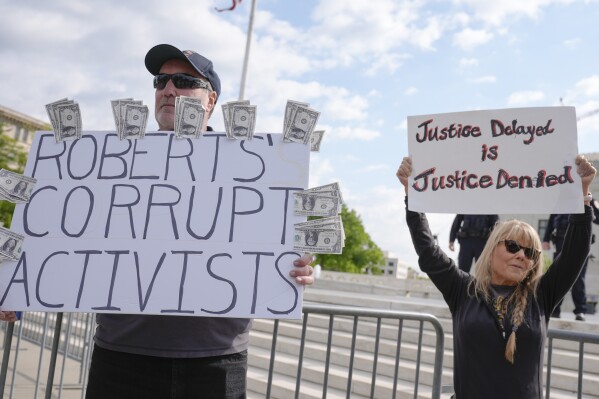
Demonstrators stand outside the Supreme Court as the justices prepare to hear arguments over whether Donald Trump is immune from prosecution in a case charging him with plotting to overturn the results of the 2020 presidential election, on Capitol Hill Thursday, April 25, 2024, in Washington. (AP Photo/Mariam Zuhaib)
About 30 demonstrators have gathered outside the Supreme Court before arguments, some wearing judicial robes with kangaroo masks and others holding signs that read, “Justice Delayed Is Justice Denied.”
That’s an apparent reference to the timing of the high court’s ultimate decision in the case, which could determine whether a trial can be held before the election in November.
Shortly before arguments were slated to begin, Trump fired off a few posts on his social media network.
In one, he declared in all-caps, “WITHOUT PRESIDENTIAL IMMUNITY, IT WOULD BE IMPOSSIBLE FOR A PRESIDENT TO PROPERLY FUNCTION, PUTTING THE UNITED STATES OF AMERICA IN GREAT AND EVERLASTING DANGER!”
Trump also said that without immunity, a president would just be “ceremonial” and the opposing political party “can extort and blackmail the President by saying that, ‘if you don’t give us everything we want, we will Indict you for things you did while in Office,’ even if everything done was totally Legal and Appropriate.”
Trump is required as a criminal defendant to be present for his New York trial. He is not required to attend the Supreme Court arguments.
An AP-NORC poll conducted in October found that less than 2 in 10 Americans have a great deal of confidence in the Supreme Court, while about half have only some confidence and around one-third have hardly any confidence at all.
The share of Americans who have hardly any confidence in the court has grown over the past few years: An AP-NORC poll conducted in 2016 found that less than 1 in 10 Americans had hardly any confidence at all in the court, while about 6 in 10 had only some confidence and around one-quarter had a great deal of confidence.
Between a decades-old court case, and an obscure constitutional provision, there are likely to be some unfamiliar concepts and terms thrown about during today’s arguments. As a sample:
- Expect to hear talk about the impeachment process and the relationship, if any, to criminal prosecution.
- There’s going to be plentiful discussion about former president Richard Nixon but not necessarily for the reasons one might think.
- The justices are known to love presenting hypothetical scenarios to lawyers as a way of testing the outer limits of their arguments. Expect that practice to be on full display.
▶ Read more about what to listen for as the Supreme Court considers Trump’s immunity case.
Of the nine justices hearing the case, three were nominated by Trump — Amy Coney Barrett, Neil Gorsuch and Brett Kavanaugh. But it’s the presence of a justice confirmed decades before Trump’s presidency, Justice Clarence Thomas, that’s generated the most controversy.
Thomas’s wife, Ginni Thomas, urged the reversal of the 2020 election results and then attended the rally that preceded the Capitol riot. That has prompted calls for the justice to step aside from several court cases involving Trump and Jan. 6.
But Thomas has ignored the calls, taking part in the unanimous court decision that found states cannot kick Trump off the ballot as well as last week’s arguments over whether prosecutors can use a particular obstruction charge against Capitol riot defendants.
A court ruling in Trump’s favor should have no bearing on the hush-money trial now underway in New York in part because that state-level case involves actions Trump took before he became president.
And though Trump’s lawyers have made the same immunity argument in a federal case in Florida charging him with hoarding classified documents, that case accuses Trump of illegally retaining the records and obstructing efforts to get them back after he left office — rather than during his presidency.
The justices will probably meet in private a short time after arguments to take a preliminary vote on the outcome. Chief Justice John Roberts would be a prime candidate to take on the opinion for the court, assuming he is in the majority.
They could simply reject Trump’s immunity claim outright, permitting the prosecution to move forward and returning the case to U.S. District Judge Tanya Chutkan to set a trial date.
They could also reverse the lower courts by declaring for the first time that former presidents may not be prosecuted for conduct related to official acts during their time in office. Such a decision would stop the prosecution in its tracks.
There are other options, too, including ruling that former presidents do retain some immunity for their official actions but that, wherever that line is drawn, Trump’s actions fall way beyond it.
Yet another possibility is that the court sends the case back to Chutkan with an assignment to decide whether the actions Trump is alleged to have taken to stay in power constitute official acts.
The Supreme Court is poised to take up on April 25 a novel legal question: can a former president be immune from federal prosecution for official acts committed while in office? The decision will determine whether Donald Trump can be prosecuted for allegedly plotting to overturn the 2020 U.S. presidential election.
The Supreme Court will actually be the third set of judges to address the question in the last six months.
Trump’s lawyers last October asked U.S. District Judge Tanya Chutkan, the trial judge overseeing the case, to dismiss the indictment on presidential immunity grounds.
The judge squarely rejected Trump’s claims of absolute immunity, saying in December that the office of the presidency does not confer a “lifelong ‘get-out-of-jail-free’ pass.”
An appeals court in February held the same, with a three-judge panel saying that for the purposes of this case, “former President Trump has become citizen Trump, with all of the defenses of any other criminal defendant.”
Trump appealed to the high court, which after several weeks, announced that it would consider “whether and if so to what extent does a former President enjoy presidential immunity from criminal prosecution for conduct alleged to involve official acts during his tenure in office.”
Former President Donald Trump speaks with construction workers at the construction site of the new JPMorgan Chase headquarters in midtown Manhattan, Thursday, April 25, 2024, in New York. Trump met with construction workers and union representatives hours before he’s set to appear in court. (AP Photo/Yuki Iwamura)
Trump addressed today’s arguments from New York, where he was visiting construction workers for a campaign stop before heading to court in his criminal hush money case.
“A president has to have immunity,” he told reporters as a crowd cheered behind him. “If you don’t have immunity, you just have a ceremonial president.”
He again complained that the judge in his felony case wouldn’t excuse him from court to attend the Supreme Court arguments in person. Criminal defendants are expected to appear in court every day during their trials.
As the Supreme Court considers another case that could shape the trajectory of Trump’s presidential reelection bid, few Americans think the high court is doing a good job of upholding democratic values in the U.S.
According to an AP-NORC poll conducted in March, one-quarter of Americans say the Supreme Court is doing a somewhat or very good job of upholding democratic values, nearly half say the court is doing a somewhat or very bad job of upholding democratic values, and about 3 in 10 say it’s doing neither a good job nor a bad job.
Republicans, however, are much more likely than Democrats and Independents to say the court is doing a somewhat or very good job of upholding democratic values.
The poll also found that while Americans are split on whether the court has too much power or about the right amount of power, only 1 in 10 think it has too little power.
Lawyers will cite a civil case involving President Richard Nixon during US Supreme Court arguments about whether former President Donald Trump is immune from prosecution for actions taken while in office.
As a longtime Justice Department official, Michael Dreeben argued more than 100 cases at the court, many of them related to criminal law.
Dreeben was part of special counsel Robert Mueller’s investigation of Russian interference in the 2016 election and joined Smith’s team last year after a stint in private practice.
In Dreeben’s very first Supreme Court case 35 years ago, he faced off against Chief Justice John Roberts, then a lawyer in private practice.
Trump is represented by D. John Sauer, a former Rhodes Scholar and Supreme Court clerk to Justice Antonin Scalia.
While serving as Missouri’s solicitor general, Sauer won the only Supreme Court case he has argued until now, a 5-4 decision in an execution case. Sauer also filed legal briefs asking the Supreme Court to repudiate Biden’s victory in 2020.
In addition to working for Scalia early in his legal career, Sauer also served as a law clerk to Michael Luttig when he was a Republican-appointed judge on the Richmond, Virginia-based federal appeals court. Luttig joined with other former government officials on a brief urging the Supreme Court to allow the prosecution to proceed.
Trump has sought to push back the trial until after the election, when, if he were to regain the presidency, he could order the Justice Department to drop the case. Prosecutors have been pressing for a quick decision from the Supreme Court so that the clock can restart on trial preparations.
It could take three months once the court acts before a trial actually starts.
If the court hands down its decision in late June, which would be the typical timeframe for a case argued so late in the court’s term, there might not be enough time to start the trial before the election.
Only 2 in 10 U.S. adults are “extremely” or “very” confident that the U.S. Supreme Court can be fair and impartial in cases involving Trump, according to a new AP-NORC poll. About one-third are “somewhat” confident, and about 4 in 10 are “not very” or “not at all” confident in the high court’s impartiality when it comes to Trump.
Even Republicans have some skepticism about whether the Supreme Court can treat cases involving Trump evenhandedly. Similar shares of Republicans, Democrats and Independents are at least very confident in the court’s ability to deal with Trump fairly. However, about one-third of Republicans and Independents are not very or not at all confident in the court, compared to about half of Democrats.
When the justices agreed on Feb. 28 to hear today’s case, they put the issue this way: “Whether and if so to what extent does a former President enjoy presidential immunity from criminal prosecution for conduct alleged to involve official acts during his tenure in office.”
That’s a question the Supreme Court has never had to answer. Never before has a former president faced criminal charges so the court hasn’t had occasion to take up the question of whether the president’s unique role means he should be shielded from prosecution, even after he has left office.
Both sides point to the absence of previous prosecutions to undergird their arguments.
Trump’s lawyers told the court that presidents would lose their independence and be unable to function in office if they knew their actions in office could lead to criminal charges once their terms were over.
The team under Special Counsel Jack Smith wrote that the lack of previous criminal charges “underscores the unprecedented nature” of what Trump is accused of.
The Supreme Court has scheduled a special session to hear arguments over whether former President Donald Trump can be prosecuted over his efforts to undo his 2020 election loss to President Joe Biden.
The case, to be argued today, stems from Trump’s attempts to have charges against him dismissed. Lower courts have found he cannot claim immunity for actions that, prosecutors say, illegally sought to interfere with the election results.
The Republican ex-president has been charged in federal court in Washington with conspiring to overturn the 2020 election, one of four criminal cases he is facing.
▶ Read more about what to expect from today’s arguments.

